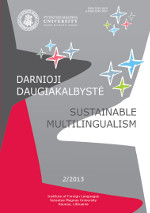Fremdsprachenerwerb im kontext der förderung des multilinguismus in Lettland
Foreign Language Learning Promoting Multilingualism in Latvia
Author(s): Rūta Ķemere, Alīda SamusevičaSubject(s): Foreign languages learning
Published by: Vytauto Didžiojo Universitetas
Keywords: pupils; foreign language acquisition; language specialization schools; promotion of multilingualism
Summary/Abstract: The publication is devoted to pupils’ foreign language acquisition process development in the work of Latvian specialized language schools. The work of language specialization schools is an important resource of multilingualism promotion and development, which in the globalization conditions, when the geographic mobility increases, is able to improve the social quality of the society, promoting the transition from a homogeneous culture and value system to culture pluralism and heterogeneity. The work of language specialization schools is structured by a pedagogical system which is flexible and open to education reforms when the paradigm of language acquisition changes. The publication aims to describe how to promote the quality of foreign language acquisition, on the grounds of the pedagogic work optimization in the German language diploma schools (DSD), in the context of multilingualism promotion. In the publication the authors analyse the basic regulations of the language education policy in Latvia in order to stabilize multilingualism positions, describe the organizational and pedagogical aspects of the German language diploma schools’ work in multilingualism development, emphasising the topicality of didactic and pedagogic diversity. The description of the pedagogic optimization and analysis in the DSD schools about the German language acquisition promotion are very important in order to be aware of the innovative pedagogical approach. In the article the empiric research results about the pupils’ motivation and quality of the language acquisition are analysed, the young people’s attitude and opinions in the context of multicultural society formation are described. Some conclusions are offered about multilingualism formation preconditions, making the strengthening of multilingualism positions topical in Latvia with the support of language specializations schools’ (DSD schools) growth, accepting these schools as the democratic and didactic initiatives of multilingual centres. It is important to guarantee the pupils an opportunity to acquire several foreign languages simultaneously at school, allow the pupils to choose freely their first foreign language when starting the foreign language acquisition in the first form, as well as improve the assessment system of pupils’ knowledge and skills in language learning, thus promoting the motivation of language acquisition. The results of the empiric research prove clearly that the motivation of the pupils from the specialized language schools, their openness towards several foreign languages, their purposeful and qualitative acquisition already at school and its creative usage in their further life are the most significant language acquisition preconditions, which are topical for the youth and which will mostly determine the quality of multilingualism in Latvia. It is important to achieve a sufficient assessment of the foreign language education role, as well as the language wholeness and uniqueness.
Journal: Darnioji daugiakalbystė
- Issue Year: 2013
- Issue No: 2
- Page Range: 126-137
- Page Count: 12
- Language: German

